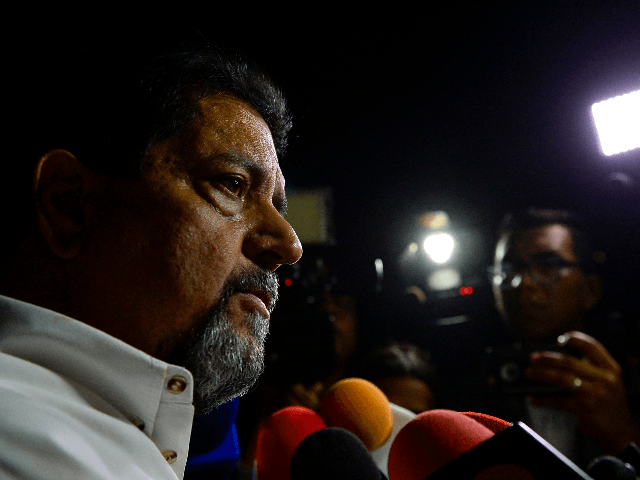The socialist dictatorship ruling Venezuela released Edgar Zambrano, first vice president of the National Assembly, from political prison late Tuesday, following talks between dictator Nicolás Maduro and various Marxist minority factions in the country.
The Maduro regime abducted Zambrano in May in retaliation for President Juan Guaidó, who as president of the National Assembly was Zambrano’s boss, announcing that he would launch a campaign to wrest control of the Venezuelan military out of Maduro’s hands. Zambrano refused to leave his car to address members of Maduro’s Secret Police (the SEBIN), so SEBIN agents towed his car into the Helicoide, the regime’s most notorious political prison.
As Maduro has not been the legitimate head of state of the country since January – and the National Assembly used its constitutional powers to make Guaidó interim president to fill the void – Guaidó is also the legitimate commander in chief of the country’s armed forces. Military leaders have remained loyal to Maduro, however, making it impossible for Guaidó to use his constitutional powers.
Maduro’s socialist tribunal announced on Tuesday that Zambrano is facing charges of “attempts against the Venezuelan State,” but that he would now await sentencing in a state of limited freedom, in which he will have to report to a court every 30 days to ensure he does not leave the country. Venezuelan state television cited Maduro’s attorney general, Tarek William Saab, as saying that Zambrano’s freedom was a direct result of the alleged dialogue between the regime and the “opposition,” an assortment of Marxist groups to which Guaidó, also a member of a socialist political party, does not belong.
Zambrano spent about four months in prison despite the Maduro regime not producing any evidence tying him to criminal activity.
His dramatic arrest occurred in early April in front of the National Assembly. Zambrano was driving when SEBIN agents surrounded his car and demanded he step out. Instead, he took to Twitter, narrating the details of his apprehension.
“We alert all the people of Venezuela that at this moment, 6:35 p.m., we are surrounded by SEBIN [agents], we are in our vehicle at the headquarters of [political party] Democratic Action in la Florida [a Caracas street],” he wrote on May 8. Less than an hour later, SEBIN agents tied his car to a tow truck and hoisted him away.
“We were surprised by the SEBIN, as we refused to get out of our vehicle, they used a tow truck to transfer us forcibly to the Helicoide. We democrats will stay firm on our feet in this struggle,” he wrote on Twitter.
The Helicoide, once destined to be a luxury shopping mall, is the Maduro regime’s special facility for prisoners of conscience; it also houses SEBIN headquarters. Survivors of the Helicoide say that torture is commonplace there, including electrocution, sleep deprivation, crucifixion, and rape.
Following his release, Zambrano used his first moments in public to demand freedom for all political prisoners.
“There must be a significant effort, first of all, to secure the liberation of all political prisoners, civilian and military,” he told reporters. He described his prison time as “being caged like animals” and said that talks with the regime may soon generate the release of as many as 58 political prisoners.
According to the Venezuelan Penal Forum, an NGO dedicated to tracking prisoners of conscience in the South American country, there are currently 477 political prisoners in Venezuela and over 8,000 people under “precautionary” deprivation of liberty measures, like house arrest or probation, in the country.
Guaidó participated in negotiations with the regime for months following his rise to power in January. As any negotiation with the regime remains extremely unpopular among Venezuelans, Guaidó insisted that the talks were not “negotiations,” but “mediations,” without explaining the difference. Finding that the talks yielded nothing but time for the regime to regroup, Guaidó walked out in early July, but changed his mind by the end of the week.
Guaidó is currently not in talks with the Maduro regime. Instead, Maduro has launched a “dialogue” with the Movement Toward Socialism, Progressive Alliance, and Red Flag parties – a consortium of unpopular Marxist groups. As a result of the talks, the United Socialist Party of Venezuela (PSUV) – Maduro’s party – will soon reenter the National Assembly, which it walked out on and replaced with an unconstitutional “National Constituent Assembly” in 2017. Returning to the constitutional legislature may allow Maduro to unseat Guaidó from the inside, though Maduro does not currently hold any legal public office.
Members of the opposition have reacted to Zambrano’s release with caution. Journalist Ibéyise Pacheco referred to his release as a “distraction,” a “play to try to create a smokescreen” to empower Maduro. Julio Borges, a senior opposition member, rejected Maduro’s “hostage trading.”
“Nicolás Maduro is trading his dictatorship’s hostages at the convenience of his miserable project to stay in power,” Borges wrote on Twitter. “We are happy that his victim, Edgar Zambrano, is free, but we cannot lose the context of what is truly behind this.”
María Corina Machado, one of the few conservative members of the Venezuelan opposition, issued a statement saying she was “happy” Zambrano was out of prison, “but he is not free.”
“We will all only be free once we expel these mafias from power, all the truth is known, as justice is done,” she said.

COMMENTS
Please let us know if you're having issues with commenting.